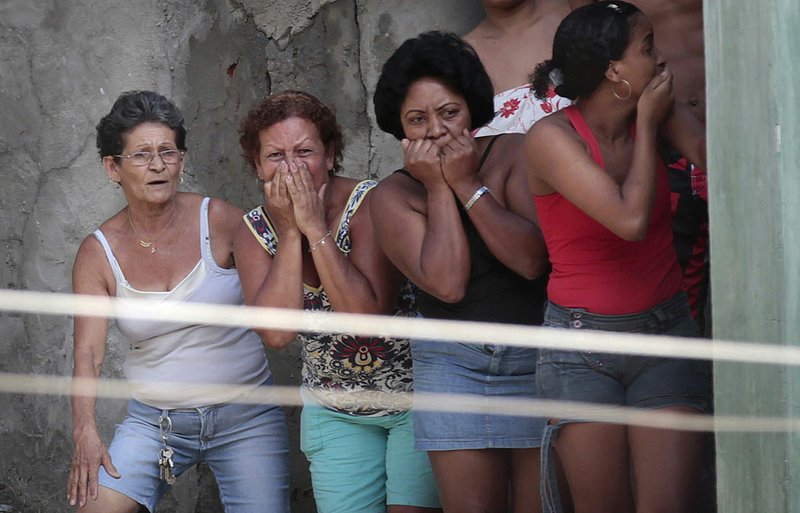RIO DE JANEIRO, Brazil — Hundreds of police and soldiers surrounded one of Rio’s most dangerous slums after the end of a sunset deadline offered to drug-gang members holed up inside, though officials late Saturday did not indicate when they might invade.
A police spokesman emphasized the superior nightfighting capabilities of the troops and officers, but a police battalion commander said there was “zero” chance of a nighttime assault to take on the estimated 600 gang members.
Authorities on Thursday took control of one slum once thought virtually impenetrable. More than 200 armed gang members fled that offensive and ran to the nearby Alemao complex of a dozen slums that are home to at least 85,000 people, followed by security forces Friday.
Hundreds of police and soldiers manned positions outside Alemao, sheltering behind armored vehicles and exchanging intermittent, heavy gunfire with the gang members at many of the 44 entrances to the slum, its shacks packed along steep hills.
The standoff comes after a week of intense and widespread violence in Rio, with dozens of mass robberies of motorists on key roadways, more than 100 cars and buses set on fire and at least 35 deaths, mostly suspected traffickers.
Authorities said the gangs are protesting a 2-year-old police campaign that has pushed the criminals out of slums where they have long ruled with impunity. It’s an effort to secure Rio before the city hosts the finals of the 2014 World Cup and the 2016 Olympics.
Police spokesman Henrique Lima Castro Saraiva said Saturday afternoon that authorities had designated a zone where traffickers could turn themselves in by walking into the area with their guns held above their heads. He said the deadline for the gang members to surrender was “when the sun sets.”
It was not clear how many gang members turned themselves over to police, though by midafternoon 16 men had accepted the police offer. One of them was reportedly the right-hand man to the leader of Alemao’s drug traffickers, said Allan Turnowski, the chief of the investigative branch of the police. Two other men were shot and arrested as they tried to escape.
Six wives or girlfriends of traffickers also had been arrested, Turnowski said.
Also, 10 inmates suspected of orchestrating vehicle burnings and mass robberies last week in a campaign meant to scare residents and warn lawenforcement away from their turf were transferred to federal, maximum-security prisons away from Rio, according to a spokesman for the Rio state public safety department.
Rio de Janeiro’s governor, Sergio Cabral, has vowed repeatedly to break the back of drug gangs that have ruled hundreds of shantytowns in the city of 6 million people - and he and other officials say now is the turning point in that effort.
Many Alemao residents spent the night away from homes for fear of being caught in crossfire. The death count since last Sunday, when the violence began, had climbed to 35 by Saturday morning. About 123 had been detained and 76 arrested by Saturday morning, said Lima Castro.
The human-rights organization Amnesty International complained that police have been too heavy-handed.
“The police response has put communities at risk,” Patrick Wilcken, Amnesty International’s Brazil researcher, said in a statement.
Many Rio residents seemed to welcome the aggressive stance, however, applauding as armored vehicles rolled past.
An information hot line where residents can pass on tips about the movements of drug traffickers received a record number of phone calls over the past few days, the coordinator, Zeca Borges, told Rio’s O Globo newspaper.
“People are supporting the operation,” he said.
A mother pushing her 1-year-old daughter in a stroller alongside Ipanema beach said she supported the lawenforcement takeover of the slums.
“I’m not one of these people who says you just have to shoot the criminals,” said Flavia Tavares de Almeida. “But we have this beautiful city, with 99.9 percent of people who are just workers, and want to live their lives, and are being terrorized by these traffickers.” Information for this article was contributed by Bradley Brooks, Cristian Salazar and Flora Charner of The Associated Press.
Front Section, Pages 14 on 11/28/2010
